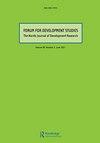在发展合作中给予宗教地位:比利时非政府组织的视角
IF 1.1
Q3 DEVELOPMENT STUDIES
引用次数: 1
摘要
摘要自21世纪初以来,越来越多的出版物导致了一个新的研究领域的出现:宗教与发展。许多文献侧重于对基于信仰的组织进行定义和分类,并将宗教行为者的独特特征和相对优势与世俗行为者相比。根据更具实证性的研究,本文考察了八个比利时非政府组织如何看待将宗教融入自身发展实践的重要性。非政府组织的叙述强调了与他们自己的宗教形象和/或考虑到他们工作环境的宗教方面有关的一些好处和缺点。虽然这些叙述通常与文献中提到的好处和风险相对应,但它们的底层细节增加了细微差别,并质疑基于信仰和世俗的非政府组织之间明确的二分法以及相对优势的工具化语言的有效性。为了深入了解宗教在发展中的各种、复杂和具体的表现方式,需要一种深入的实证和情境化方法。本文章由计算机程序翻译,如有差异,请以英文原文为准。
Giving Religion a Place in Development Cooperation: The Perspective of Belgian NGOs
Abstract Since the early 2000s an increasing number of publications has led to the emergence of a new research field: religion and development. Much of the literature focuses on defining and classifying faith-based organizations, and attributes distinctive characteristics and comparative advantages to religious actors in contrast to their secular counterparts. In line with more empirically oriented research, this article examines how eight Belgian NGOs perceive the importance of incorporating religion in their own development practice. The NGOs’ narratives highlight a number of benefits and drawbacks related to their own religious profile and/or taking into account religious aspects of the context in which they work. While these narratives generally correspond with benefits and risks mentioned in the literature, their ground-level detail adds nuance and questions the validity of a clear-cut dichotomy between faith-based and secular NGOs, and the instrumentalizing language of comparative advantages. To achieve insight into the various, complex and specific ways in which religion is present in development, a deeply empirical, contextualized approach is needed.
求助全文
通过发布文献求助,成功后即可免费获取论文全文。
去求助
来源期刊

FORUM FOR DEVELOPMENT STUDIES
DEVELOPMENT STUDIES-
CiteScore
1.80
自引率
14.30%
发文量
24
期刊介绍:
Forum for Development Studies was established in 1974, and soon became the leading Norwegian journal for development research. While this position has been consolidated, Forum has gradually become an international journal, with its main constituency in the Nordic countries. The journal is owned by the Norwegian Institute of International Affairs (NUPI) and the Norwegian Association for Development Research. Forum aims to be a platform for development research broadly defined – including the social sciences, economics, history and law. All articles are double-blind peer-reviewed. In order to maintain the journal as a meeting place for different disciplines, we encourage authors to communicate across disciplinary boundaries. Contributions that limit the use of exclusive terminology and frame the questions explored in ways that are accessible to the whole range of the Journal''s readership will be given priority.
 求助内容:
求助内容: 应助结果提醒方式:
应助结果提醒方式:


